Vocaţia de bibliotecar.
It is an article about the library and book, about the past, present and perspectives of the librarian profession, about the attractiveness of this trade.
More...We kindly inform you that, as long as the subject affiliation of our 300.000+ articles is in progress, you might get unsufficient or no results on your third level or second level search. In this case, please broaden your search criteria.
It is an article about the library and book, about the past, present and perspectives of the librarian profession, about the attractiveness of this trade.
More...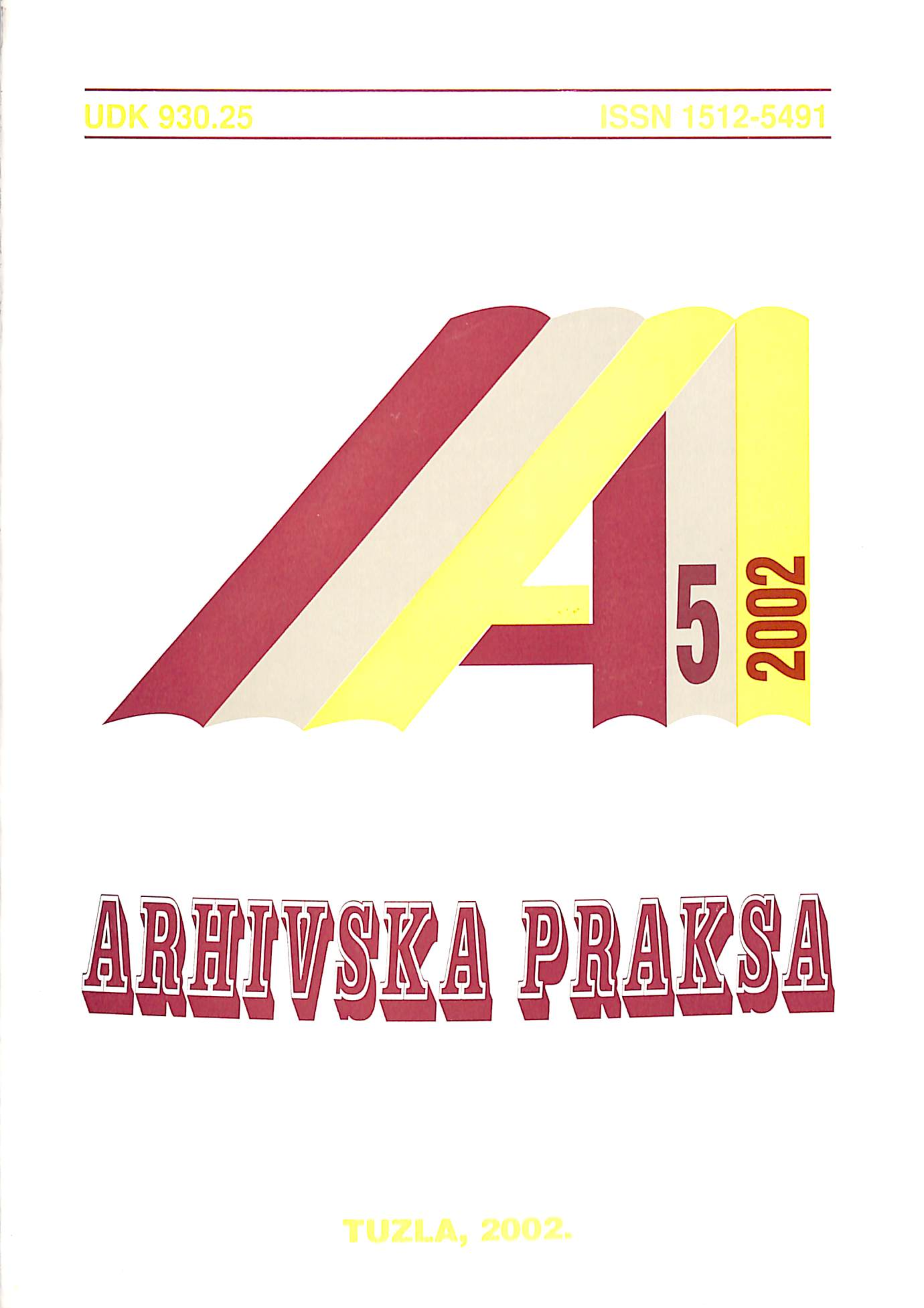
Positiv regulations of the Republic of Srpska are: The Law on Cultural Goods and the Law on Archival Activity, implementing regulations passed on the basis of the law, and the Instructions and regulations issued by the archives of the republic of Serbia under the law. The adopted regulations represent a significant step in the development of archival activity in Republika Srpska. They should be able to represent a harmonized and complete system, often mutually incompatible with these regulations. These regulations are in the function of the necessary independence of Republika Srpska legislation as well as archival activities as a whole. Of course, this does not mean that there is no express interest in the organization of this activity under the jurisdiction of the Archive of Bosnia and Herzegovina. The Law on Archival Activity is the last in a series of laws in the field of cultural goods protection. This is a fundamental law for all types of archival material, which is of immense importance, as the development of archival activity certainly goes hand in hand to acquiring archives for downloading and preserving electronic documents. In this respect, the adoption of regulations in this area is closely monitored. Unfortunately, in the process of adopting these regulations, the Republika Srpska Archive has not been included or consulted in any way. Of the direct relevance to the archive service are also the regulations regulating the handling of documents while these are still found by the creators, ie the way of keeping certain types of records or deadlines for keeping the documents. Although archival activity in Republika Srpska after 10 years is not organized on the entire territory of Republika Srpska, nor is it adequately organized, nor is it equipped with exhaustive means, nor is it financed, it can be concluded that laws and accompanying subordinate and implementing regulations in this area represent a rounded unity and a powerful tool for performing all the functions of the Archive.
More...
This paper describes the work phases of arranging and processing archive material of the socialist period in the Archives of Bosnia and Herzegovina, from which it is clear how well water office records in the registers have influenced the quality and scope of professional affairs in the Archives. Arrangement and processing of the archival material of the socialist period were made according to the principles of archival theory and practice, while jobs on the valorisation of the arts depended on current socio-political opportunities. The application of a List of registry material with deadlines in the archive practice of the Archive of BiH has proved to be quite positive. Whether these lists are extensive and whether the competent committee that brings them and adopts it is not the subject of this paper. The application of the list in the registries of the authorities and administration is a great help and saving time for professional workers in the BiH Archive. Funds that already contain junk materials are already in the registers can be used until their final settlement and processing. Work on arranging such a registered registry will be far simpler than fixing materials from the period up to 1956. It is in the interest of the archives profession to continue to work on the improvement of the list and to implement all the positive regulations in the office business because all changes in registers (good or bad) reflect on later work on arranging and processing the material.
More...
In the previous archival practice in Bosnia and Herzegovina, the issue of evaluation of registry materials was not treated in an adequate manner. Evaluation issues were mainly addressed indirectly through the Law on Archival Activity, while some of the near by-pass acts were not regulated. The process of evaluating the registers of all creators and even business entities requires a serious and objective approach to this problem and a great deal of expertise. The practice nowadays has been that the valorisation of the registrable materials is carried out by passing the List of categories as a mandatory normative act. However, in the very process of creating a List of categories, the most frequent faces and the best acquaintances of this issue were not usually involved, and they were often implausible and could not serve their purpose. This type of missing categories has been negatively reflected in actual transition processes, where the practical function of documentation has come to the point of expression. Thus, in a large number of processes, the degree of documentation had direct impact and on the very course of transitional processes. In order to overcome the deficiencies in the process of valorisation, it is necessary to establish clear and unique criteria for the evaluation of the registrable material in all the creators. In the field of economy, besides the orientation lists, which serve as the basis for the adoption of special lists of companies with the application of all positive regulations. Since it is a very serious and expert job, it is necessary to work the most straightforward faces. It is only in this way that a valorisation of the registrable material can be done, all with the aim of obtaining the material that would have historical scientific and cultural value.
More...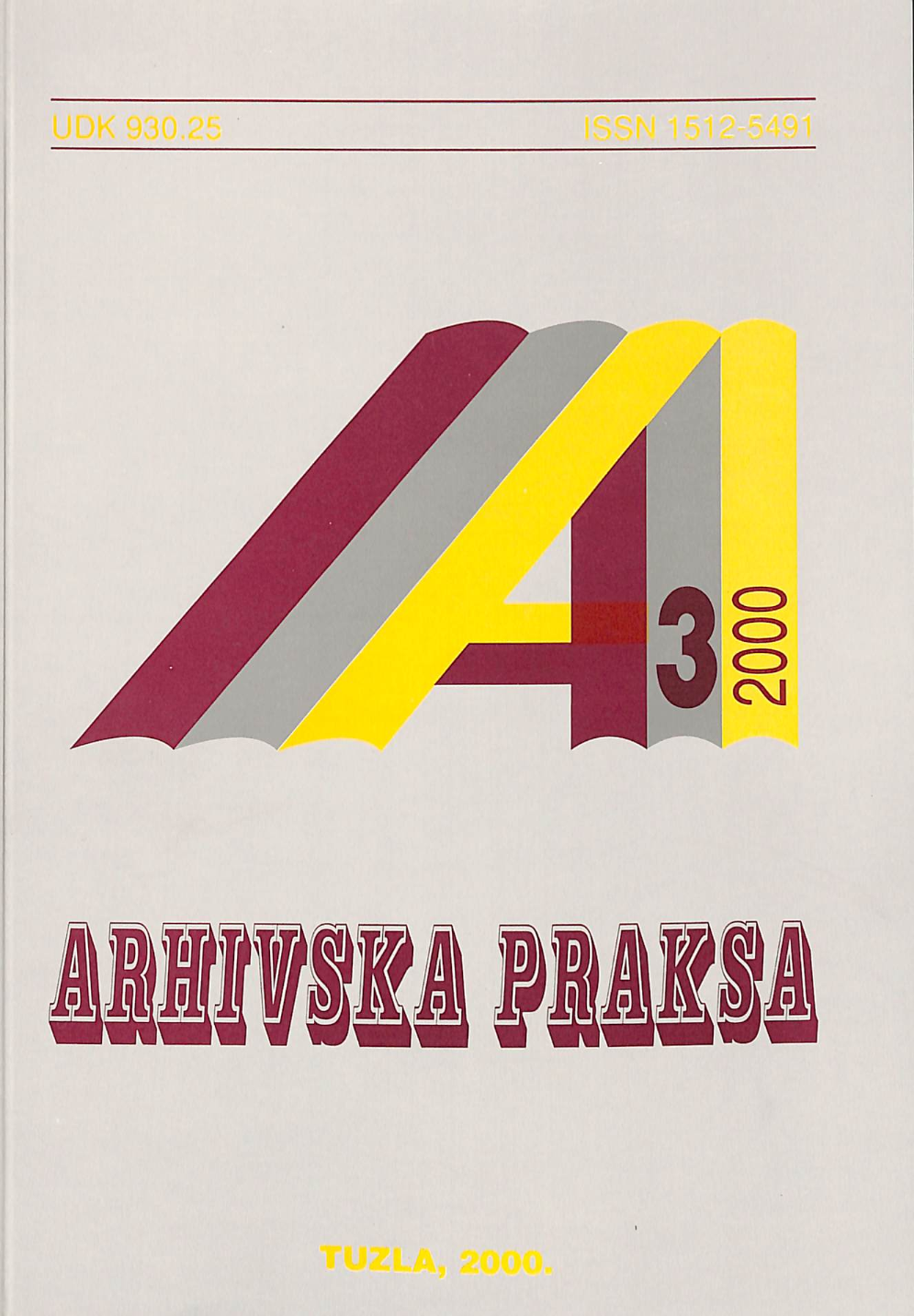
The record creators daily meet the questions of managing and destiny of the records, because there is a plenty of the documents, that must be transported from offices to archival repositories. Sometimes they do not exactly what to do with the records. On the other side it is true that by record creators more and more records originate. There are many people that meet the problems of selecting the archives from the records every day. First directives are found in the Law on archives, which in its article 9 offer the possibility that local community can found an archives. In the article 10 it is prescribed, that local communities must keep the records of all bodies of the community. In the article 11 of presented law it is specially defined the valuation of the archives and records. The record creators have to keep the records, according to article 20, and care for their own records, for their preserving, material security, entireness and wellsettling. The selection of the archives from the records is presented in six points. The author presents the criteria for evaluation of the records through the Rule book, that is: necessity, importance, specificity and originality of documents and information, mass of documents, preservation, outlook and out imagine. In the end author presents the articles of the rule book from the article to the article and the enclosure of the rule book without commentary to stress the fact, that the records that would became archives have no professional estimation.
More...
Numerous potentials problems follow the work of registers which are performing their activities at the level of the Federation of Bosnia and Herzegovina and the state of Bosnia and Herzegovina. Problems influence at their archival and office operations, and also in the way that these jobs are performed by an insufficient number of archivists. It satisfies, however, their qualification structure and a regulated system of professional exams.
More...
One of the results of constant and persistent additional education of archivists which has been organised by Tuzla Archive is a relatively satisfying scope and quality of performed work on the protection and systematisation of register material in those registries, whose representatives participate actively in the work of this and other conferences and seminars. However, all this is not enough for the system of registry and office work in registries to be brought up to the enviable level. Archival activity requires, among other things, special approach to the staff education due to the fact that application of modern information techno- logy has progressed in many registries. When one also bears in mind that there is a great number of archivists who are the beginners in this work every year, it becomes clear that it is necessary to constantly pursue new forms and contents of their addditional education.
More...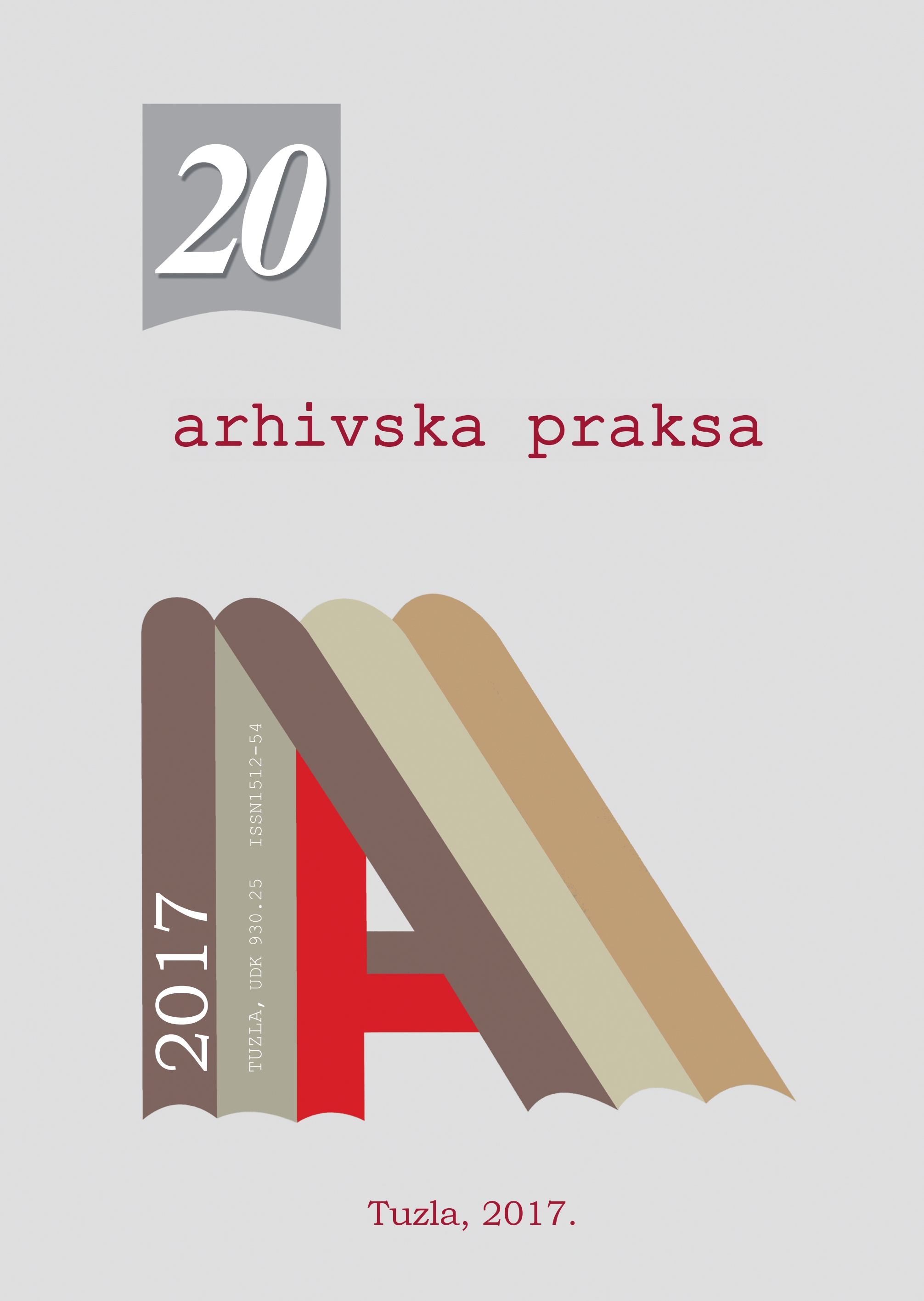
The changes brought with the breakup of the previous social and political system reflected on the placement and the work of the archives. Adequate and effective reaction was necessary to preserve the priceless archive wealth. For that urgent matter, there was an urge for bringing up new laws and by-laws by which the archives will work and take the measures in their hand according their jurisdictions. The necessity of instant structural rearrangement of the archives and the archive duties came up with the new changes. Yet, even faster, the priority was with a limited due time to collect and preserve the archive materials from the transformed institutions and organizations. Mostly the workers in the inspection department and the department for archive preservation on behalf of the owners faced with these challenges. In general the efforts of all the sectors was equally important by the.
More...
Undisclosure of legal regulations with archival practice is evident when registering in the archive book. This problem is especially evident in registers with a large amount of registry material, longer working periods and multiple organizational units. Legislation, in all acts regulating this matter in Bosnia and Herzegovina, is quite imprecise and gives the possibility of different interpretations, which makes employees who work on archival affairs in doubt. In the paper the author analyzes the legal regulations related to keeping the archive book. Also, the author presents the experiences of the Travnik Cantonal Archives in the preparation of the registry material, and proposes amendments to the legislation that would be consistent with archival practice.
More...
When it comes to the company’s archives, it is primarily thought of as an archiving system used by companies. Also systematisation is also challenging, as a reorganization of the archives of the administration of local self-governments, because it enters the archive system of the municipality it belongs to, but the separate office is independent. The local community uses its own protocol and the order of the employee in office in the circumstances. The introduction of a working scheme that facilitates the acceleration and regulation of the activities of the office represents the living application of archival science as a science. Using the decennial experience, an ad hoc system was created that creates a “red thread” between still active (operational) documentation and one that is selected to become archival material, and then historical. Thus, the circumstances of the faster selection (selection) of documentation for scrapping, as well as the improvement and facilitation of the office business and the work of the archivist are acquired.
More...
Mircea Filip collection were integrated in the Scientific Library in 2016. It contains patrimony of great importance. The author invites readers to an exciting journey into the world of books; gathered in a life of Man; to discover together their charm and wisdom; the spirit of the characters created in different time spaces. True biblical values have today become the books on which the dedication or Ex-Libris of the author is preserved
More...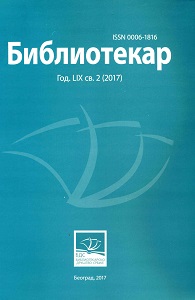
The paper in the ›rst place de›nes the term electronic library and its role in the development of library management. Historically, electronic library lies between traditional and digital library. Integrated library system is emphasized as a precondition for the development of an electronic library. The integrated library system enables the uni›cation of library operations. Special emphasis in this paper is put on the development of electronic library in our country. Also, the automation in Serbian libraries from the 1980s to the present, as well as di«erent library systems in Serbian libraries are presented, with a focus on their advantages and disadvantages.
More...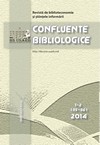
The authors presents a rare book collection, which Nicholae Testemiţanu Scientific Medical Library, which belongs to German doctor bibliophile Richard Koch. In 1937 R. Koch settled in Kislovodsk city, in 1944 he gave a portion of his library Kislo-vodsk Institute of Medicine, which in 1945 was transferred to Chisinau. Koch collection numbers about 2600 volumes of medicine, biology, philosophy, history. Exclusively, 150 books of XVI-XVIII Centuries are considered rare books. A special place is occupied by Jewish-related books. All books in the collection are provided with an ex-libris of R. Koch and enforced by a particular graphic
More...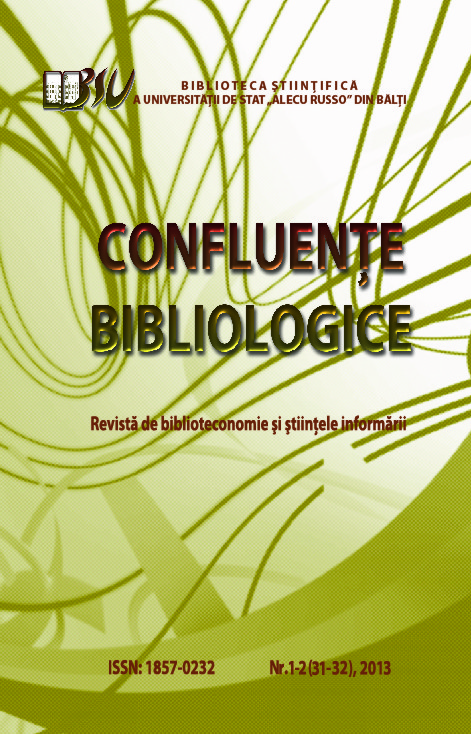
Bibliographic descriptions preparation has been and remains an issue of cataloguer. Tha first cataloging rules appeared in the 19th century and over the years have been revised and updated. The most important meetings with the participation of international experts in the theory and practice of the bibliographical descriptions were those of Paris (1961) and Frankfurt (2003)
More...
This article reflects the bibliometric research book on Wilhelmi collection, founded in 2004. The collection consists of approximately 979 titles in 1726 copies of documents covering all fields of science
More...
The article reflects the research work of documentary heritage (preserved in old documents) from the rare book collection of the Scientific Library of the „Alecu Russo" State University of Balti. A series of articles highlights with topics from all areas of human knowledge published in the pages of magazines from the 1930s: Viaţa Românească, Revista Fundaţiilor Regale, Convorbiri literare, Boabe de grîu, Cuget Clar etc.. These magazines (the rich and valuable content) marked an important moment in the evolution and affirmation of national culture, contributed to the promotion of the values of the inter-war literature
More...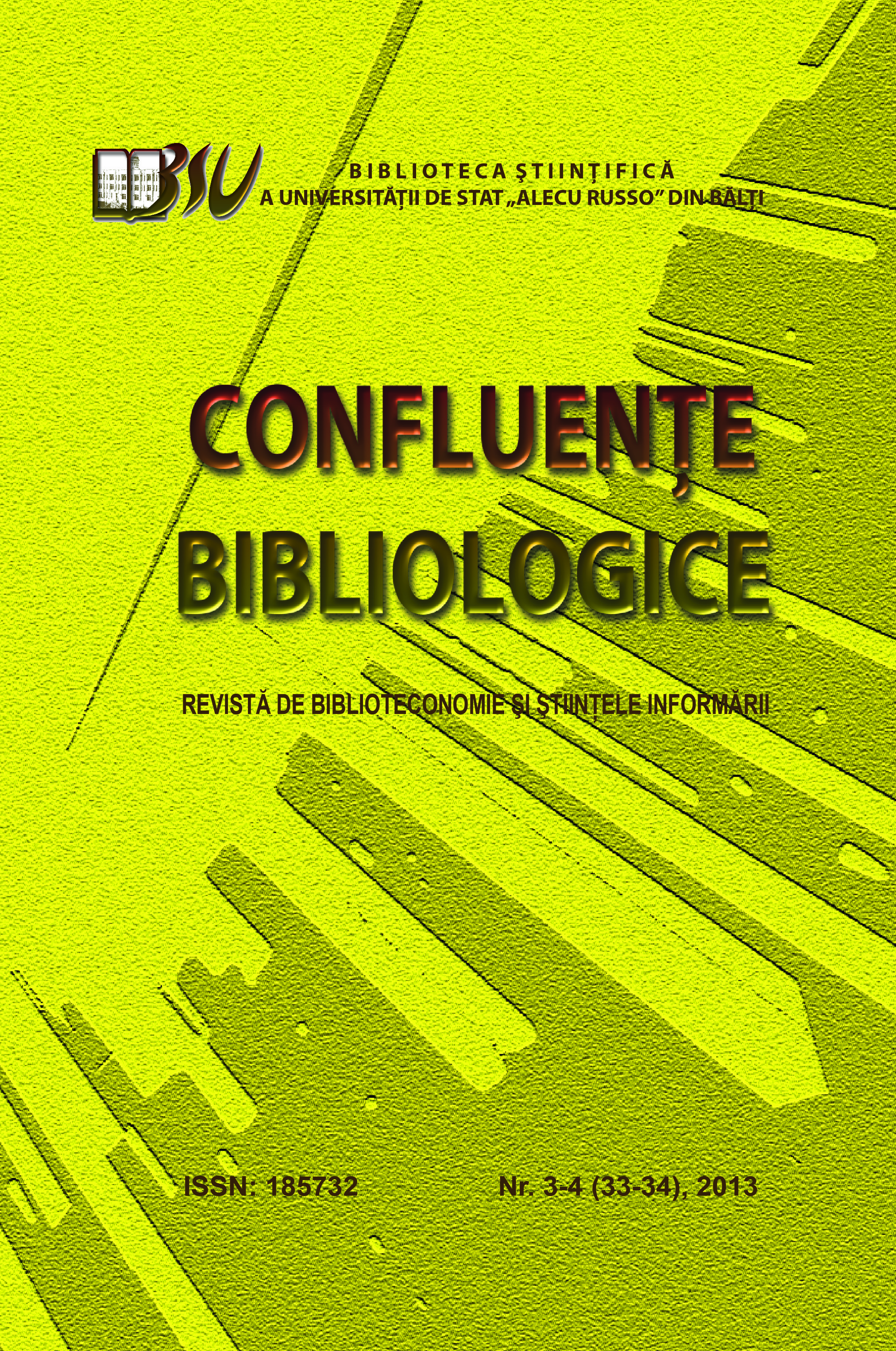
This article includes works' dissemination of professional workshop entitled Authority Files (names and subjects) in the automated system: realities and trends. The workshop took place on 29 of November, 2013, at the USARB Scientific Library
More...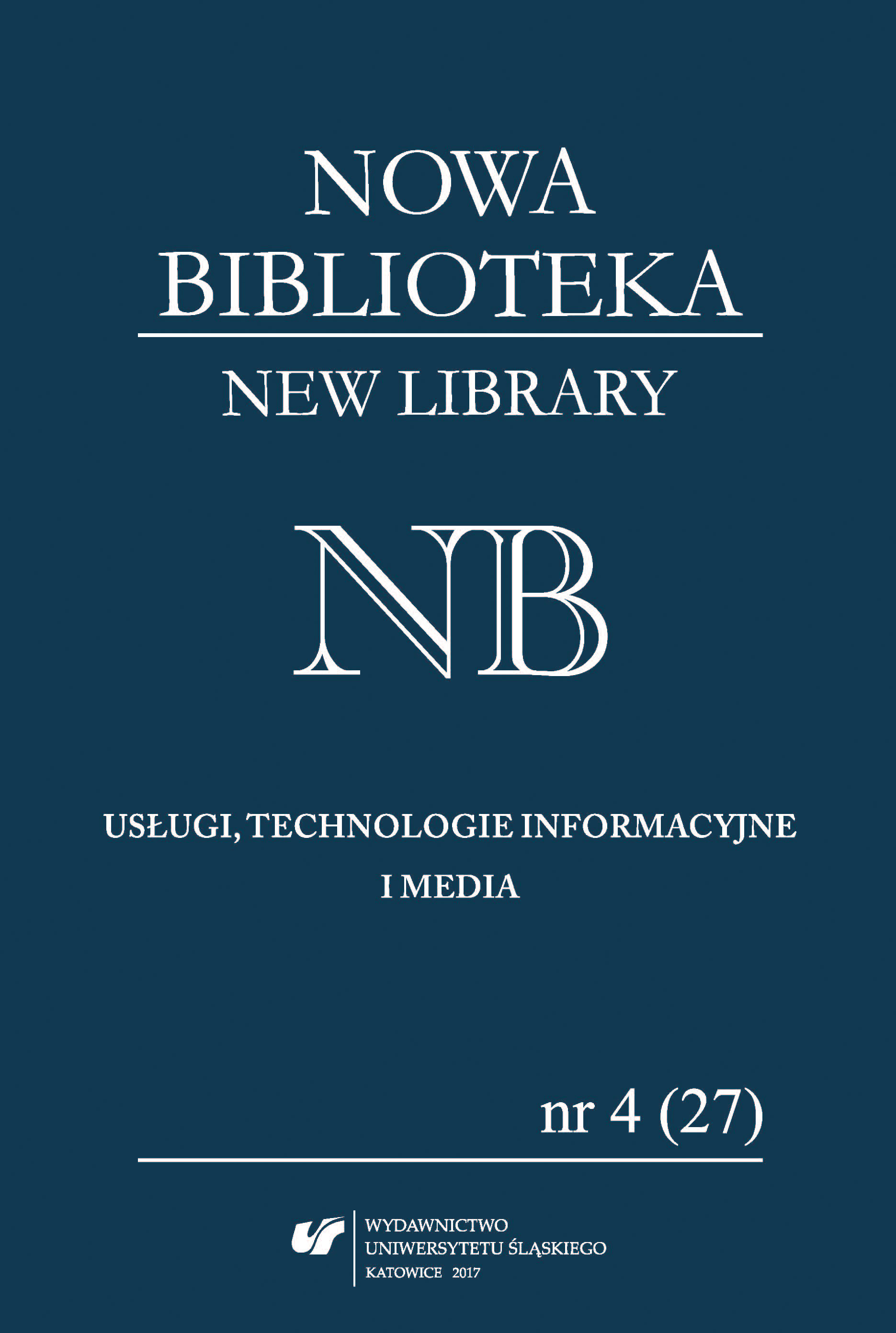
The object of the article is to analyse the application of norms and standards of bibliographical descriptions of electronic documents by selected scholarly publishers. The text familiarises the reader with the norms concerning bibliographical footnotes appended to electronic documents as well as the Citation Style Language and its application in bibliographical management software. A quantitative analysis was performed upon the guidelines for authors published on the websites of the publishers. The systems of references, the principles of the creation of bibliographical footnotes and the examples of descriptions were compared, and the compatibility of these items with the PN-ISO 960 norm was verified.
More...
In the community of scholars scholarly periodicals perform various functions, inter alia they create a space for communication in the said community, they are the first outlet where results of research may be published or they are helpful in the evaluation of scholarly literature. Serial publications may also furnish inspiration for the flourishing of scholarship itself. After the Arianta database we assume that in Poland 84 library science and scholarly information periodicals are published. One of such titles is “Nowa Biblioteka. Usługi, Technologie Informacyjne i Media” (until 2014 known as “Nowa Biblioteka. Zeszyty Monograficzne Koła Naukowego Bibliotekoznawców Uniwersytetu Śląskiego”). Until the end of 2015 the periodical of the Student Association of Library Scientists of the University of Silesia in Katowice was the only periodical of student library science associations on the citation index list of periodicals of the Ministry of Science and Higher Education – Part B. Bytaking these reasons into account one performed a bibliometrical analysis of the periodical.The study material involved all publications featured in the periodical since its establishment in 2015. Serial publications were studied in depth. The formal and content-related features were taken into account, which in this case applied only to the part Artykuły i komunikaty [Articles and reports], thus showing the directions of research of scholars. The statistical changes of the “Nowa Biblioteka” were presented as well as the estimated directions of development.
More...
The article constitutes an analysis of the foreign Polonica published in the years 2001–2014 in Poland’s neighbouring countries. It explores the form of writing, the chronological and linguistic range, and the scope of themes of the publications released in the particular countries. The article was developed on the basis of a bibliography of foreign Polonica featured in “Nowa Biblioteka” in the years 2016–2017.
More...